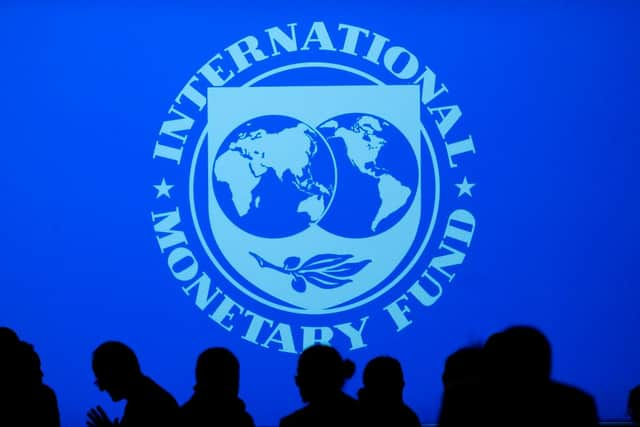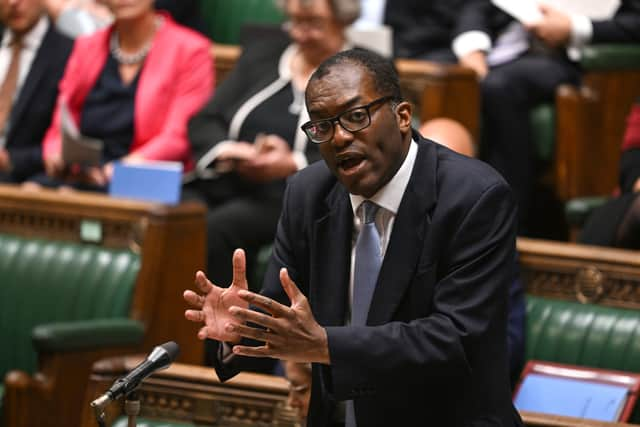What is the IMF? What it has said about UK forecast, who is involved in organisation, what does it stand for?
and live on Freeview channel 276
The International Monetary Fund (IMF) has upgraded its assessment of the UK economy, with its latest findings published on Tuesday (23 May) suggesting the country should avoid a recession in 2023.
The organisation has said it now expects GDP to grow 0.4% this year and 1% the following year. It is good news for Rishi Sunak, who pledged to grow the economy in 2023 in a speech delivered earlier this year.
Advertisement
Hide AdAdvertisement
Hide AdIt marks a significant turnaround since autumn 2022, when the IMF warned the UK was on course for a major recession in the wake of Liz Truss’s Mini Budget. The international body also criticised then-Chancellor Kwasi Kwarteng for his tax plans, which they argued risked increasing inequality.
But the UK still faces major economic hurdles in the coming months. Its growth could be derailed by sticky inflation, as it could force the Bank of England to hike interest rates yet further. They currently sit at a 14-year high of 4.5% as the UK’s central bank attempts to push the rate of price rises down to a level that means it is not eating into households’ purchasing power at an unsustainable rate.
So, what exactly is the IMF - and what has it said about the UK economy?
What is the IMF?
The IMF is an international organisation that is governed and made accountable to 190 member countries. It is led by Kristalina Georgieva, an economist who previously led the World Bank.
Advertisement
Hide AdAdvertisement
Hide AdMember countries pay a fee to be a part of the IMF, with richer countries paying in more. States must also abide by rules governing how transparent they are about their economies. The IMF’s main goal is to ensure “sustainable growth and prosperity” in these nations. Part of what it does is to discourage states from pursuing policies that would be harmful to prosperity.


The IMF monitors all of the world’s economies, providing advice for how they can perform to the best of their abilities, and also tracks potential global economic issues, like trade disputes. Another role it plays is as a lender of last resort for countries whose economies get into a nosedive they cannot pull out of. When this scenario happens, the IMF can loan up to $1 trillion to allow these countries to restructure their economies and their sovereign debt.
Low-income countries pay no interest on these loans. The largest amount the IMF has paid out to a member has been the $57 billion (£53.4 billion) it lent to Argentina in 2018.
While the organisation has had success in the past by getting Mexico and Brazil through their respective economic crises, it has been criticised for being too heavy-handed in other situations. For example, when Greece’s economy collapsed in 2009, the austerity measures it demanded the country introduce were deemed to have damaged the Greek economy and its society.
Advertisement
Hide AdAdvertisement
Hide AdUsually, most of the organisation’s work focuses on developing countries. It means the intervention it made on the UK economy in September 2022 was unprecedented.
What did IMF say about Liz Truss economic plans?
In an intervention on 27 September 2022, the IMF called on the UK government to change course away from its tax cutting agenda, particularly its removal of the top rate of income tax. The organisation urged then-Chancellor Kwasi Kwarteng to “reevaluate the tax measures”.


In a nutshell, its criticism of the Mini Budget was that it was coming at the wrong time for the global economy. It said high inflation and its resulting pressure on household incomes - particularly those of the poorest people in society - made “large and untargeted fiscal packages” a bad idea. It also warned the 45p tax rate cut would “likely increase inequality”.
While the Truss’s allies hit back at the IMF - former Brexit Secretary Lord Frost was especially critical of the organisation - the government eventually heeded its warning. After Truss unceremoniously sacked Kwarteng and replaced him with Jeremy Hunt, the new Chancellor scrapped many of the most controversial measures in the mini budget. Under Rishi Sunak’s premiership, he then announced a series of major tax increases in a bid to restore the UK’s economic credibility in the Autumn Statement 2022.
Advertisement
Hide AdAdvertisement
Hide AdThe Spring Budget then saw the Chancellor attempt to push the economy towards growth by bidding to get early retirees and parents of young children back into the workforce. However, he was criticised by some on the Conservative backbenches for hiking taxes, and by opposition parties for implementing measures that would be more likely to benefit the wealthy - like scrapping the lifetime allowance on pensions.


What has IMF said about the UK?
In its latest forecast, which was published on 23 May, the IMF upgraded the UK’s forecast. Instead of a 0.3% decline in growth in 2023, which it predicted in April, it said it expects a 0.4% increase - a 0.7% swing. But it also warned the country’s GDP remains “subdued” and was exposed to “considerable” risks, such as high inflation and potential turmoil in the banking sector.
High inflation means consumer spending power is reduced at a rapid rate, while banking sector turmoil could make it harder for people to get mortgages, or for businesses to access the loans they need to expand. Both could drag GDP down as they restrict spending and mean the country is likely to produce fewer goods and services, i.e. pretty much everything we consume day-to-day.
The IMF said the challenges with inflation would mean the Bank of England would be “likely” to further increase interest rates and keep them high for some time. While it praised the government’s economic agenda, it also called for policy changes that could free up money to ease the public finances, like scrapping the triple lock pensions policy and closing loopholes for the wealthy in income and wealth taxes.
Comment Guidelines
National World encourages reader discussion on our stories. User feedback, insights and back-and-forth exchanges add a rich layer of context to reporting. Please review our Community Guidelines before commenting.
